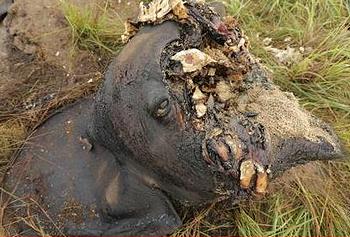
YAOUNDE, Cameroon, February 6, 2013 (ENS) – Poachers have killed some 11,000 elephants in the Central African country of Gabon since 2004, finds a study by the Gabonese National Parks Agency, WWF and the Wildlife Conservation Society released today.
“Gabon, refuge of biodiversity in the Congo Basin region, has become the prime target of poaching. Hordes of bandits heavily armed and well organized to engage in the killing of elephants in particular to meet the insatiable lucrative black markets in Asia, says the Gabonese National Parks Agency.
“Our country pays a heavy price for the intensification of wildlife crime,” the agency said. “The situation has reached such a magnitude that our natural heritage is threatened.”

In 2004, Minkébé’s National Park and its surroundings in northern Gabon held Africa’s largest forest elephant population. But poachers have wiped out up to 77 percent of the population, the study shows.
“The situation is out of control. We are witnessing the systematic slaughter of the world’s largest land mammal,” said Bas Huijbregts, head of the Central African part of WWF’s global campaign against illegal wildlife trade.
“Some reports lead the world to believe that the ivory war has moved from the Central Africa region to other parts of the continent,” Huijbregts said. “This is wrong. What has changed is that these criminals are now also attacking the better protected elephant herds in Eastern and Southern Africa.”
“But here in Central Africa, unnoticed to the world, elephants are losing this war at lightning speed,” he said.
Fiona Maisels, a conservation scientist at WCS who has been analyzing the survey data, said that the data indicates a crisis across the region.
“The Minkébé data are representative of trends across all remaining forest elephant strongholds in the region, not to speak of the Democratic Republic of the Congo, which is believed to hold 7,000 to 10,000 elephants, or less than ten percent of its population twenty years ago,”
Gabon, Maisels explained, represents only about 13 percent of the forests of Central Africa but is inhabited by over half of Africa’s forest elephants.
“The Minkébé National Park was home to Gabon’s biggest elephant population and to probably the largest forest elephant population in Africa. At least until these data came out,” she said.
In the Central African Republic, which in the mid-1980s held up to 80,000 elephants, poachers are taking advantage of political instability to wipe out the country’s remaining elephants.
Speaking from Bayanga in the Central African Republic, Guian Zokoe, who is in charge of the Dzanga-Sangha Protected Areas for the country’s Ministry of Water and Forests, says in the past few days poachers have killed at least 17 elephants around the Ngotto forest.
Unconfirmed reports by villagers hint that some 60 elephants were also killed further north, near the town of Yaloke, he said, adding there are reports of killings throughout the country.
“The Central African Republic’s new government has to send its armed forces to stop these poachers before they hit its last elephant stronghold, Dzanga-Sangha, a recently declared World Heritage Site,” he said.
“It is not just a question of protecting CAR’s natural resources, but of stopping these armed groups from waltzing around the country and terrorizing local populations wherever they go,” said Zokoe.
“Governments in the region such as Cameroon, Chad and Gabon are recruiting more rangers and send their armies to fight these poachers. But that is not enough,” Huijbregts says.
“The international intelligence community needs to get involved in this fight as soon as possible, in order to identify, track and put out of business these global criminal networks, which corrupt governments, erode national security and hamper economic development prospects,” said Huijbregts.
The conservationists say that to effectively end the poaching crisis, countries in East Asia must address their exploding demand for ivory, which has resulted in record prices.
“Unless the governments of the region and demand countries treat this issue as an international emergency we cannot rule out that, in our lifetime, there will no longer be any viable elephant populations in Central Africa,” Huijbregts said.
Massive quantities of illegal African ivory are being laundered through Thai shops, say the conservationists. They are asking that everyone join them in signing a petition asking Thai Prime Minister Yingluck Shinawatra to ban all ivory trade in Thailand.
Copyright Environment News Service (ENS) 2013. All rights reserved.
